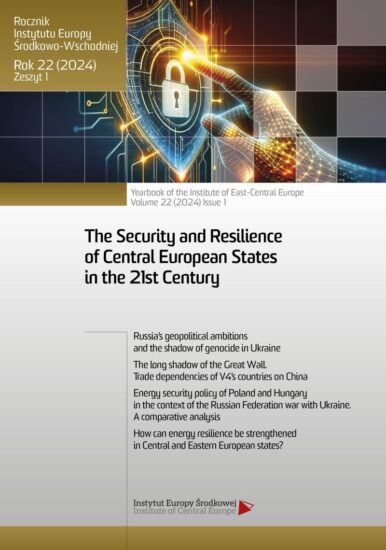Energy security policy of Poland and Hungary in the context of the Russian Federation war with Ukraine. A comparative analysis
Polityka bezpieczeństwa energetycznego Polski i Węgier w kontekście wojny Federacji Rosyjskiej z Ukrainą. Analiza porównawcza
Małgorzata Kamola-Cieślik
ORCID: Małgorzata Kamola-Cieślik:
0000-0003-2956-3969
Afiliacja: Uniwersytet Szczeciński
Nezir Akyesilmen
ORCID: Nezir Akyesilmen:
0000-0001-8184-5280
Afiliacja: Selçuk University, Konya
Pages: 87-104
Edition: Lublin 2024
DOI:
https://doi.org/10.36874/RIESW.2024.1.5
Citation method: M. Kamola-Cieślik, N. Akyesilmen, Energy security policy of Poland and Hungary in the context of the Russian Federation war with Ukraine. A comparative analysis, „Rocznik Instytutu Europy Środkowo-Wschodniej” 22 (2024), z. 1, s. 87-104, DOI: https://doi.org/10.36874/RIESW.2024.1.5
Keywords:decyzje polityczne, surowce energetyczne, Unia Europejska
Keywords: energy raw materials, energy security, European Union, political decisions
Abstract:
The 2022 conflict between Russia and Ukraine highlighted the extent to which European Union member states rely on Russian energy resources. This article aims to conduct a comparative analysis of the energy security policies of Poland and Hungary during the energy crisis in Europe caused by the war in Ukraine between 2022 and 2023. To achieve the research purpose mentioned above, the following research questions were formulated: 1. What stance did Hungary and Poland take regarding the EU’s proposal for sanctions against the Russian Federation in the field of energy raw materials? 2. What actions did the governments of Hungary and Poland take to reduce their dependence on Russian energy raw materials? The following methods were used in the research: decision-making method, comparative method, analysis of the foundational research and statistical method. The analysis showed that the Polish government’s policy was focused on reducing its reliance on Russian energy imports and the need to find an alternative to eastern suppliers. The pro-Russian government of Hungary, on the other hand, was opposed to abandoning Russian energy resources and lacked a developed plan to shift away from them.
Bibliography:
- BOX, Węgry podpisują porozumienie gazowe z Rosją. Będą mogły zwiększyć zakupy, Businessinsider.com.pl, 11 April 2023, https://businessinsider.com.pl/gospodarka/wegry-podpisuja-porozumienie-gazowe-z-rosja-w-razie-potrzeby-bedziemy-mogli-kupic/s8zgnzj [25.03.2024].
- Eurocoal, Coal and lignite production and imports in Europe 2022, https://public.euracoal.eu/download/Public-Archive/Library/Charts-Maps/Coal-in-Europe/EURACOAL-Coal-in-Europe-2022-04.pdf [14.03.2024].
- European Commission, Natural gas supply Statistics Explained, May 2024, https://ec.europa.eu/eurostat/statistics-explained/SEPDF/cache/10590.pdf [11.03.2024].
- Eurostat, Energy statistics – an overview, 31 May 2023, https://ec.europa.eu/eurostat/statistics-explained/index.php?title=Energy_statistics_-_an_overview [14.03.2024].
- Gizińska I., Rudnik F., Sadecki A., Szijjártó w Moskwie: podtrzymanie współpracy energetycznej z Rosją, 14 April 2023, https://www.osw.waw.pl/pl/publikacje/analizy/2023-04-14/szijjarto-w-moskwie-podtrzymanie-wspolpracy-energetycznej-z-rosja [25.03.2024].
- Héjj D., Paszkowski M., Konsekwentny wzrost uzależnienia Węgier od Rosji, “Komentarze IES” 2021, no. 455, https://ies.lublin.pl/wp-content/uploads/2021/10/ies-komentarze-455-152-2021.pdf [14.03.2024].
- Kleinschmidt P., Maćkowiak-Pandera J., Ponad billion złotych na import surowców energetycznych do Polski, Forum Energii, 18 February 2020, https://www.forum-energii.eu/ponad-bilion-zlotych-na-import-surowcow-energetycznych-do-polski [11.03.2024].
- Ministerstwo Aktywów Państwowych, Raport podsumowujący interwencyjny import i dystrybucję węgla kamiennego w sezonie grzewczym 2022/2023, Warsaw, April 2023, https://www.gov.pl/web/aktywa-panstwowe/wicepremier-jacek-sasin-zapewnilismy-polakom-wegiel-na-zime-dotrzymalismy-slowa [12.02.2024].
- Ministry of Innovation and Technology, National Energy and Climate Plan, 1 January 2021, https://faolex.fao.org/docs/pdf/hun212429.pdf [21.03.2024].
- PM Orbán: “We have managed to defeat the Commission’s proposal to ban the use of oil from Russia in Hungary”, Facebook, 31 May 2022, https://www.facebook.com/AboutHungary/videos/pm-orb%C3%A1n-we-have-managed-to-defeat-the-commissions-proposal-to-ban-the-use-of-oi/1184755592292259/ [20.02.2024].
- Polska wypowiedziała porozumienie gazowe ws. Jamału, 23 May 2022, https://www.gov.pl/web/klimat/polska-wypowiedziala-porozumienie-gazowe-ws-jamalu [14.03.2024].
- Polski Instytut Ekonomiczny, Unia Europejska niezależna od Rosji? Alternatywne źródła dostaw surowców energetycznych, Warsaw, March 2022, https://pie.net.pl/wp-content/uploads/2022/03/PIE-Raport_UE-niezalezna-od-Rosji-1.pdf, s. 19 [14.03.2024].
- Rada Unii Europejskiej, UE przyjmuje piąty pakiet sankcji wobec Rosji w związku z jej agresją wojskową na Ukrainę, 8 April 2022, https://www.consilium.europa.eu/pl/press/press-releases/2022/04/08/eu-adopts-fifth-round-of-sanctions-against-russia-over-its-military-aggression-against-ukraine/ [24.03.2024].
- Speech by President of Ukraine Volodymyr Zelenskyy at a meeting of the European Council, President of Ukraine Volodymyr Zelenskyy Official website, 25 March 2022, https://www.president.gov.ua/en/news/promova-prezidenta-ukrayini-volodimira-zelenskogo-na-zasidan-73809 [24.03.2024].
- Spike J., Hungary’s Orban wins exemption in EU Russian oil embargo, APNew.com, 31 March 2022, https://apnews.com/article/russia-ukraine-viktor-orban-hungary-989184ef46804f2f7ac3eaa411fa7dbd [20.02.2024].
- Szőke E., Hungary concludes three energy agreements with Russia, Ceenergynews.com, 14.04.2023, https://ceenergynews.com/oil-gas/hungary-concludes-three-energy-agreements-with-russia/ [24.03.2024].
- TL, Europejski rynek ropy naftowej. Skąd i za ile UE importuje surowiec?, Forsal.pl, 05.04.2023, https://forsal.pl/biznes/energetyka/artykuly/8691193,europejski-rynek-ropy-naftowej-skad-i-za-ile-ue-importuje-surowiec.html [14.03.2024].
- UNdata A world of information, Conventional crude oil, http://data.un.org/Data.aspx?d=EDATA&f=cmID%3ACR [14.03.2024].
Keywords:
decyzje polityczne,
surowce energetyczne,
Unia Europejska
